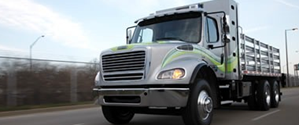As a professional driver, you know that fuel is your highest variable cost. With the rising price of traditional fossil fuels gouging your bottom line and everyday fuel management critical to your business and livelihood, one has to look to alternative sources of get up and go. Natural gas offers a clean burning and affordable source of fuel.
 |
|
The Freightliner Business Class M2 112 line of trucks and tractors with natural gas offers unparalleled benefits that help businesses increase productivity, performance, and profitability. Learn More ⇒ |
Natural gas vehicles (NGVs) function on the same chief fundamentals as a gas powered vehicle - the engines run on a mixture of fuel (gasoline, diesel fuel or natural gas) and air ignited by a spark plug to move the piston up and down, “just like a bicycle rider pushing against the pedals to make the bike go.”
Natural gas can power all the same vehicles currently powered by gasoline and diesel fuel – light to heavy-duty; on-road and off-road. However, since natural gas is a gas rather than a liquid at standard pressure and temperature, some modifications are required to make an NGV work efficiently. The main differences are found in how it must be handled and stored.
Fleets around the country are discovering the advantages of natural gas vehicles:
-
Price: The main factor driving interest in natural gas fuel is the delta in price between diesel and natural gas. While average diesel costs are back in the $4.00 per gallon range, the price of compressed natural gas (CNG) fuel has averaged about $1.80 per diesel gallon equivalent. Even with up to 10% degradation in fuel economy vs. diesel, natural gas fuel can save you thousands of dollars per year in fuel costs depending on the application.
-
Fewer Emissions: CNG (compressed natural gas) vehicles are cleaner than traditional vehicles, producing on average 20% fewer greenhouse gas (GHG) emissions than diesel. They greatly reduce pollutants from emissions such as CO2, and produce little or no evaporative emissions during fueling and use.
-
Lower Noise Levels: Heavy-duty NGVs have decibel level that is 10 decibels quieter than comparable diesel vehicles.
-
Decrease in foreign dependencies: Utilizing natural gas means we will reduce dependence on foreign oil, as natural gas is a domestically sourced fuel.
So when using a NGV seems like a logical choice, why are there some ojections to making the switch?
-
Finding Natural Gas: Finding a station that carriers Natural Gas is not always efficient and can be hard if you are making long hauls across country. However, fuel sources and centers are taking notice of the benefits of natural gas as a fuel. In 2012, TravelCenters of America (TA) announced that it had partnered with Shell Oil to construct and operate a network of natural gas fueling lanes at TA locations along the U.S. Highway System. With fuel centers like TA supporting natural gas vehicles, it’s only a matter of time before you see more and more of these vehicles on the road and fuel centers to keep them going.
-
Environmental Impacts: Natural gas extraction also has an environmental impact with champions on both sides making their opinions heard. Proponents of “fracking,” natural gas extraction via induced hydraulic fracturing, point to the economic benefits from the vast amounts of untapped supplies the process can extract. Opponents point to potential environmental impacts, including contamination of ground water, risks to air quality, surface contamination from spills and the health effects these 8000 foot deep wells might have on communities near the fracking sites. For these reasons hydraulic fracturing has come under scrutiny internationally, with some countries suspending or even banning it. The U.S. continues to utilize fracking to extract natural gas.
With the rising price of traditional fossil fuels, using a natural gas alternative could really save you money for the long haul. Whatever your opinion on the extraction process or other more traditional fossil fuels, there is no denying natural gas will soon have an impact on the way you get down the road.